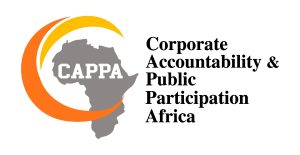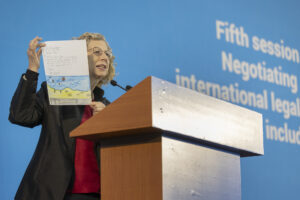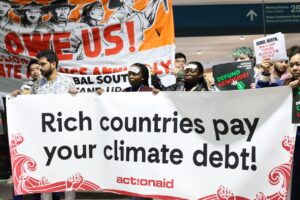
“For instance in Nigeria, women own and manage about 10% of natural resources despite the fact that Nigeria is the only country in Africa where we have the reservoir of women with qualifications, competence, expertise and the proof is seen at the international level, the number two of the United Nations is a Nigerian woman, the first of the World Trade Organisation is a Nigerian woman, so what stops Nigeria from implementing the gender policy?” she queried.
Eyong is of the opinion that the legal framework is not gender responsive and, because of that, Nigeria has the issue of women not having the same participation, leadership and remuneration in the extractive industry.
She opined that another issue that is plaguing the sector is gender-based violence.
“A study showed that gender-based violence is capable of reducing the Gross Domestic Product (GDP) by at least 2% which is around trillion of dollars, so the fact that there is Gender Based Violence at the level of the communities and institutions, the sector is not going to be effective.
“In the communities where extractive activities take place in Nigeria, women are the one leading 15% households in rural areas which is put at about 30 million people, while in urban areas it is about 19% and, if you calculate that, it is about 40 million people and as we leave those number of people out of development and resources, it is a time bomb waiting to explode,” she maintained.
Dr Mina Ogbanga, Current CSO Lead, Nigeria Extractive Industries Transparency Initiative (NEITI), also frowned at the so-called 2060 long term target set by the Federal Government to achieve net-zero.
She said: “You cannot talk about petroleum without talking about the people affected by it and social justice and also about the fact that you get clean energy only from bad energy meaning that technology mainstreaming and the improvement of the quality of presentation and management of or coastal wealth processing is important.
“Why are they telling us about 2060, why are they not cleaning it up and change our processes now? Why can’t we use technology that is accessible and available to us now, so PIA is just one aspect of responding to the process where we are saying we are building support and promoting sustainability. There is segregated data for GHG emission; there is segregated data for gender environment and social inclusion issue, among others.
“How are the communities spurring along, how do you measure the impact of what you are doing? PIA is trying to address these issues but there is still so much to be done which is how to mainstream our local activities and ensure that they represents global standards and one of them is that we need to promote disclosure by identifying companies and confirm their GHG emission, segregate data in terms of encouraging and recognising that gender and social inclusion issues are key when you talk about issues around petroleum all these among others will make PIA a lot functional and more effective.”
On his part, Dapo Omolade, CEO, Hybrid Group, suggested that the active players in the industry need to find ways of soothing the pains of the host communities and do the right thing going forward.








